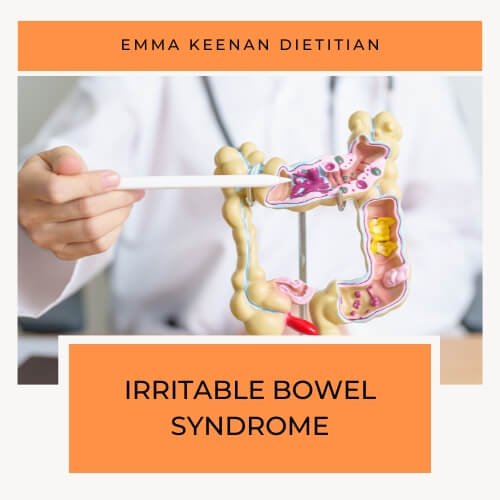IBS Dietary Management
Gaining a deeper understanding of IBS can be helpful for you or someone you care about in several ways:
Ensuring a proper diagnosis is obtained, rather than relying on self-diagnosis
Learning about the available options for managing IBS symptoms
Developing empathy and understanding for individuals living with IBS
What is Irritable Bowel Syndrome (IBS)?
Irritable bowel syndrome (IBS) is classified as a functional gastrointestinal (GI) disorder. But what does that mean exactly? A functional gut disorder refers to a condition where the digestive system's standard functions are disrupted. These functions include:
Peristalsis, the movement of the intestines.
The sensitivity of the intestinal nerves.
The complex communication between the gut and the brain, known as the gut-brain axis.
Brain regulation of these processes.
It's important to note that functional GI disorders don't involve structural damage to the gastrointestinal tract. Diagnosis of functional GI disorders primarily relies on symptom criteria and the exclusion of other potential structural causes.
How Are Structural Gastrointestinal Disorders Different?
Structural gastrointestinal disorders involve actual physical damage or abnormalities to the GI tract, which can be identified and diagnosed using tools like endoscopy, gastroscopy, imaging, or blood tests.
Conditions such as coeliac disease, Crohn's disease, ulcerative colitis, reflux, or diverticular disease show clear signs of GI damage, often detected with blood tests and diagnosed with endoscopy.
Endoscopy is a procedure where a thin tube with a camera and light is introduced, mouth (gastroscopy) or anus (colonoscopy), to view the gastrointestinal tract. It allows gastroenterologists to visually inspect the gastrointestinal tract for any signs of damage and take biopsies of tissue if necessary.
Who Develops IBS?
Irritable bowel syndrome is a common gastrointestinal disorder affecting about 1 in 7 individuals. It can develop at any age, affecting children, adults, and older people. However, it is usually diagnosed before the age of 40, with fewer cases diagnosed after 50. Several factors are thought to contribute to this:
Early Diagnosis: People often seek medical advice soon after symptoms appear, leading to earlier diagnosis.
Improved Diagnostic Techniques: Advancements in diagnostic methods may help detect IBS sooner.
Self-Management: Older individuals may have learned ways to manage their symptoms over time.
Natural Symptom Changes: IBS symptoms may naturally decrease as a person ages.
Women are more likely to experience IBS, with around 67% more women affected than men, although this may be partly due to differences in healthcare-seeking behaviour between genders.
What are the Symptoms of IBS?
Irritable bowel syndrome is associated with several common symptoms that may overlap with more serious conditions, highlighting the importance of professional diagnosis.
Common IBS symptoms include:
Bloating
Abdominal distension
Constipation
Diarrhoea
Alternating stools, between constipation and diarrhoea
Urgency to have a bowel movement
Excessive flatulence (gas)
Lower abdominal pain
These symptoms can vary in severity and can have a significant impact on various areas of life, including:
Work: Sick days, reduced productivity, and increased time spent in the bathroom.
Relationships: Affecting interactions with friends and family.
Sexual Life Potentially affecting intimate relationships.
Social Life: Challenges related to dining out, bathroom access, and discomfort.
Body image: Concerns about abdominal bloating and distention.
Mental health: Links to anxiety, depression, and stress.
Sleep Patterns: Disrupting sleep patterns.
Fatigue: Contributing to tiredness.
Travel: Fear of long journeys or travel due to symptoms.
It's important to note that IBS symptoms can overlap with those of several severe conditions, such as:
Coeliac disease
Inflammatory Bowel Disease (e.g., Crohn's Disease and Ulcerative Colitis)
Diverticular Disease
Endometriosis
Pancreatic exocrine insufficiency
Endocrine disorders
Bile salt malabsorption
Pelvic floor disorders
Intestinal cancers
Red Flag Symptoms: When to See Your GP
Some symptoms of IBS overlap with those of more serious conditions, and specific "red flag" symptoms require further investigation. If you experience any of the following, consult your GP for immediate evaluation:
Family history of bowel diseases
Unexplained weight loss
Rectal bleeding or blood in stool
Age over 50
Persistent diarrhoea
Fever
Nocturnal bowel motions (waking you up at night)
Recurring vomiting
Severe symptoms or those that get progressively worse
What Causes IBS?
The exact cause of irritable bowel syndrome remains unclear, but several factors likely contribute to its development, including:
Imbalance in gut bacteria
Stress and anxiety triggering symptoms (due to the gut-brain axis)
Changes in gut motility (increased for diarrhoea or decreased for constipation)
Increased gut sensitivity, making regular digestive movements painful
Post-infectious IBS, which can develop after a gastrointestinal infection like gastroenteritis, Bali belly
Getting a diagnosis is important.
How is IBS Diagnosed?
Your GP or gastroenterologist will diagnose IBS based on symptoms that meet the Rome IV criteria and tests to rule out more serious conditions.
IRRITABLE BOWEL SYNDROME
Diagnostic criteria*
Recurrent abdominal pain on average at least 1 day/week in the last 3 months, associated with two or more of the following criteria:
Related to defecation
Associated with a change in the frequency of stool
Associated with a change in form (appearance) of stool
* Criteria fulfilled for the last 3 months with symptom onset at least 6 months prior to diagnosis
Rome IV Diagnostic Criteria for IBS Subtypes:
IBS-C (IBS with predominant constipation): more than 25% of bowel movements Bristol Stool chart type 1 or 2 and less than 25% of bowel movements Bristol Stool chart type 6 or 7.
IBS-D (IBS with predominant diarrhoea): more than 25% bowel movements Bristol Stool chart type 6 or 7 and less than 25% bowel movements Bristol Stool chart type 1 or 2.
IBS-M (IBS with mixed bowel movements): more than 25% bowel movements Bristol Stool chart type 1 or 2 and more than 25% bowel motions Bristol Stool chart type 6 or 7.
IBS-U (IBS unclassified): People who meet the diagnostic criteria for IBS but whose bowel habits do not fit into the above categories.
Tests used to rule out other conditions may include:
Blood tests, stool tests, endoscopy, or imaging
Not recommended: Breath tests, IgG food intolerance tests, faecal microbiota tests, or intestinal permeability tests
You get to choose whether you avoid your favourite foods or drinks.
Treatments Options for IBS
There are many treatment options available to manage IBS symptoms. Someone with irritable bowel syndrome may benefit from using one or more strategies to manage their symptoms.
Dietary Interventions:
Identifying trigger foods (e.g., alcohol, spicy foods, caffeine), you can then choose if and when to avoid them
Exclusion processes, e.g., low FODMAP diet
Modifying fibre intake
Modifying meal patterns and portion sizes
Using fibre supplements
Psychological Therapies:
Cognitive Behavioural Therapy (CBT)
Gut-directed hypnotherapy
Biofeedback therapy
Lifestyle Interventions:
Regular enjoyable movement
Improving sleep quality
Reducing stress
Medications targeting:
Diarrhoea, constipation, pain, gas, and bloating
Supplements:
Probiotics (not all probiotic supplements are evidenced for IBS)
Herbal supplements
Why Work with a Dietitian Specialising in IBS?
A dietitian with expertise in irritable bowel syndrome can help you:
Avoid unnecessary dietary restrictions
Achieve symptom relief more effectively
Reduce the severity of symptoms
Save you time, money and frustration
Gain the knowledge to manage your IBS symptoms independently
Take Control of Your IBS Today
Struggling with IBS symptoms can be overwhelming, but you don’t have to navigate it alone. Working with a dietitian specialising in IBS can help you identify triggers, relieve symptoms, and regain control of your life.
Book an appointment today and start your journey toward effective, personalised IBS management. Together, we’ll create a plan that works for you.
References
Bertin, L., Zanconato, M., Crepaldi, M., Marasco, G., Cremon, C., Barbara, G., Barberio, B., Zingone, F., & Savarino, E. V. (2024). The Role of the FODMAP Diet in IBS. Nutrients, 16(3), 370.
Black, C. J., Staudacher, H. M., & Ford, A. C. (2022). Efficacy of a low FODMAP diet in irritable bowel syndrome: Systematic review and network meta-analysis. Gut, 71(6), 1117–1126. Low-FODMAP Diet Improves Irritable Bowel Syndrome Symptoms: A Meta-Analysis
Read More
What is the low FODMAP Diet? — St Kilda Dietitian & Nutrition (emmakeenandietitian.com.au)
Let's Have a Poo-versation — St Kilda Dietitian & Nutrition (emmakeenandietitian.com.au)
How are farts made? — St Kilda Dietitian & Nutrition (emmakeenandietitian.com.au)









